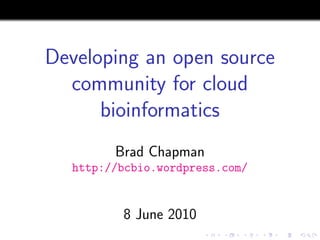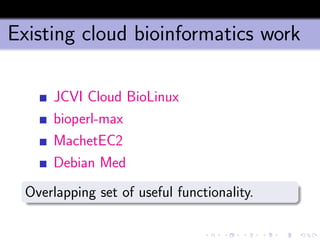Developing an open source community for cloud bioinformatics
- 1. Developing an open source community for cloud bioinformatics Brad Chapman http://bcbio.wordpress.com/ 8 June 2010
- 2. Overview 1 Building open source bioinformatics communities is hard. 2 Developer resources are a productive target. 3 Framework: collaborative software images and data snapshots.
- 3. Motivation Open source OpenBio, Biopython Graduate school ŌĆō developed distributed algorithm. Never reused. Work Startup: Automated biological pipelines. Research hospital: Democratization of analysis.
- 4. Filters in biological computing Working in same biological area Interest in developing open source code Technical abilities Your software is good enough
- 5. Successful bioinformatics Sean Eddy, HMMER ...the best software in the ’¼üeld is often an unplanned labor of love from a single investigator. http://selab.janelia.org/people/eddys/blog/?p=313
- 7. Successful community projects OpenBio: BioPerl, Biopython, BioJava Bioconductor Common theme Aimed at developers. Biologists bene’¼üt indirectly.
- 9. Establishing common platform The solution = to all our problems Remove install and distribution barriers Building block for scaling
- 10. Existing cloud bioinformatics work JCVI Cloud BioLinux bioperl-max MachetEC2 Debian Med Overlapping set of useful functionality.
- 11. Integrated community solution Inclusive but con’¼ügurable Easy to contribute Automated Bootstrap bare machine to fully ready distributed AMI. http://github.com/chapmanb/bcbb/tree/master/ec2/ biolinux/
- 12. Inclusive but con’¼ügurable # Top level YAML configuration file specifying # groups of programs to be installed. packages: - python - r - erlang - databases - viz - bio_search - bio_alignment - bio_nextgen - bio_sequencing - bio_visualization - phylogeny libraries: - r-libs - python-libs
- 13. Easy to contribute # Configuration file defining R specific libraries that # are installed via CRAN and Bioconductor. cranrepo: http://software.rc.fas.harvard.edu/mirrors/R/ cran: - ggplot2 - rjson - sqldf - NMF - ape biocrepo: http://bioconductor.org/biocLite.R bioc: - ShortRead - BSgenome - edgeR - GOstats - biomaRt - Rsamtools
- 14. Automated def install_biolinux(): ec2_ubuntu_environment() pkg_install, lib_install = _read_main_config() _apt_packages(pkg_install) _do_library_installs(lib_install) def _ruby_library_installer(config): for gem in config[ŌĆÖgemsŌĆÖ]: sudo("gem install %s" % gem) Fabric: http://docs.fabfile.org/
- 15. Ready to use biological data % ls /referenceGenomes/ % ls Hsapiens/hg18 Athaliana arachne Celegans bowtie Dmelanogaster bwa Ecoli eland Hsapiens maq Mmusculus seq Msmegmatis snps Mtuberculosis_H37Rv ucsc Paeruginosa_UCBPP-PA14 phiX174 Rnorvegicus Scerevisiae Xtropicalis http://github.com/chapmanb/bcbb/blob/master/galaxy/galaxy_fabfile.py
- 16. Organization: Codefest 2010 www.open-bio.org/wiki/Codefest_2010













![Automated
def install_biolinux():
ec2_ubuntu_environment()
pkg_install, lib_install = _read_main_config()
_apt_packages(pkg_install)
_do_library_installs(lib_install)
def _ruby_library_installer(config):
for gem in config[ŌĆÖgemsŌĆÖ]:
sudo("gem install %s" % gem)
Fabric: http://docs.fabfile.org/](https://image.slidesharecdn.com/chapmanopensourcecloud-100607133256-phpapp01/85/Developing-an-open-source-community-for-cloud-bioinformatics-14-320.jpg)

